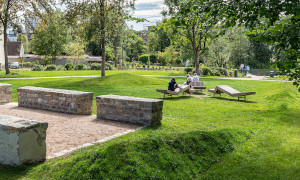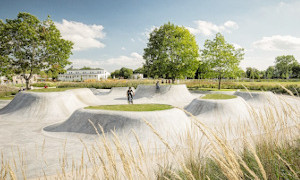Experts and broad initiative criticize: Revision of the state development program by the state government misses the challenges for Bavaria. What is needed is a complete reboot of state planning.

Before the hearing in the Landtag on Thursday, 08 December 2022, three of the nine invited experts held a press conference in which they voiced massive criticism of the revised version of the Landesentwicklungsprogramm (LEP). Together with the socially broadly anchored initiative "Ways to a better LEP", in which they are active, they showed that the central instrument of state planning is currently not sufficiently used to steer Bavaria's development in a future-proof way. The major challenges for Bavaria's future, such as climate change, digitalization, equal living conditions in urban and rural areas or spatial justice, cannot be mastered with the state government's draft.
"The whole young generation is moved by the issue of the climate crisis and how we can manage and plan better than previous generations with the available resources," explains Antonia Kainz, state chairwoman of the Catholic Rural Youth Movement. "Far too little of this can be found in the new LEP, even if better proposals from science and professional associations are available. Particularly important to us are the clear goals for climate protection in spatial planning and special formats for youth participation, which have hardly existed so far. If young people are asked more, this will bring quite a lot of new momentum, for example, in mobility and renewable energies in rural areas!"
"In view of the current challenges, we consider strong regional planning, including strengthened regional planning, to be absolutely necessary," explains Barbara Weihs of the Bund Deutscher Landschaftsarchitekt:innen, Landesverband Bayern, who was invited by the state parliament as an expert. "A sustainable LEP must formulate landscape-based, spatially integrated strategies and future-proof action concepts, set clear goals under the premise of climate, biodiversity and land protection. The prerequisite is a joint, open-ended planning process that develops positive visions, livable images of the future and leads to a transformative design process supported by all. Unfortunately, neither the necessary technical and substantive goals are set by the second update, nor is a resilient perspective for the implementation of the LEP shown."
"In principle, we recognize in the draft of the state government a revitalized claim to actively steer the development of the Free State," explains Richard Mergner, Chairman of BUND Naturschutz in Bayern e.V., who was also invited as an expert. "But binding goals and, above all, effective implementation instruments are missing for too many central aspects. The result is not only piecemeal, it inevitably involves numerous conflicting goals - for example, if increased climate protection is placed on an equal footing with the continuing goal of sustained growth, or if the construction of even more roads remains the goal and land conservation is simply placed alongside it. All of these things together are quite simply not possible. It is equally problematic that the comprehensive and well-founded work of civil society on the LEP was practically ignored in the final draft. This clearly shows that the LEP needs to be completely revamped, both in terms of content and in the drafting process."
"Despite massive pressure to act, the opportunity to create an effective design framework for climate-friendly and equal development in urban and rural areas is being missed," criticizes Franz Damm, Vice President of the Bavarian Chamber of Architects. "Central principles such as sufficiency and the finiteness of CO₂ and land budgets are seen, but not established as necessary objectives of spatial planning. There is a lack of qualifying target statements for the spatially integrative development of the natural and cultural landscape in Bavaria, in which greater consideration is also given to historically evolved village and town structures and buildings that characterize a place. Recycling management, reuse of valuable building fabric, multifunctional land uses must become binding objectives of the LEP. Therefore, we emphatically call for state and regional planning with more innovative steering power for the necessary transformation processes."
"The UN's Sendai Framework for Disaster Risk Reduction must become an integral part of the LEP. This is the only way we can prevent disasters or reduce their impact in the long term," adds Prof. Dr.-Ing. Norbert Gebbeken, President of the Bavarian Chamber of Civil Engineers. "I have so far completely missed this systemic consideration in the partial update of the LEP. With regard to land use in Bavaria, the Bavarian Chamber of Civil Engineers is calling for consistent CO2 pricing so that existing buildings are given more value and we thus reduce new sealing. For this purpose, a state subsidy for unsealing measures is necessary. We also call for the reconstruction of public urban spaces with green and blue infrastructure."
"The concept of the LEP is out of time," summarizes Stephan Reiß-Schmidt from the German Academy for Urban Development and Regional Planning, Bavarian regional group, who was also invited by the state parliament. "It stems from an era of great hopes for growth with no regard for planetary boundaries and no political will to shape the future. Numerous spatial and planning-related academies, chambers and associations have therefore already joined forces in 2018 and developed proposals for a better LEP. To make Bavaria fit for a socially and climate-just future, we need a complete reboot with an open and democratic process. For a new type of state and regional planning, spatial justice, the protection of the biosphere, a pollution-free environment and the containment of the climate crisis are immovable guard rails."
- More information on the initiative "Ways to a Better LEP" can be found at https://www.besseres-lep-bayern.de/.
- An article by the Süddeutsche Zeitung can be found in the print edition of December 06, 2022 and in the online edition.
- Latitude: 0
- Longitude: 0


